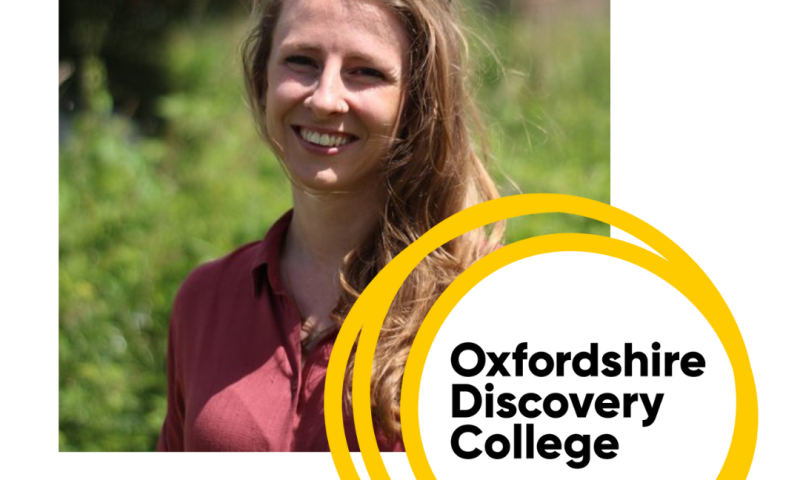We spoke with Laura Harte from Oxfordshire Discovery College about how they use co-production in their work.
What does your organisation do and who do you work with? What is your role?
The Oxfordshire Discovery College is a small charity that aims to improve the mental health and wellbeing of children and young people aged 4-25 across Oxfordshire, by delivering interactive and evidence-based psychoeducation programmes. We believe that by helping children and young people to develop a better understanding of mental health and wellbeing the more empowered they feel to make good choices, and the more self-awareness they have to understand when they’re feeling unwell and may need to seek help. If we can equip them with robust strategies for self-care, the better able they are to manage the challenges life may throw at them. Laura is the voluntary CEO of the organisation.
Why is co-production a priority in your work?
The Discovery College model is based on an international model of Recovery Colleges – the equivalent service for adults. The core principles of this approach include it being inclusive to everyone, educationally-based and, critically, co-produced. This makes co-production and co-production not an ‘add-on’, but a fundamental part of the way we do things. This means that it weaves through every aspect of our work, rather than only happening in a defined area – all of our programmes are co-designed and co-delivered by a pair of lived- and learned-experience Facilitators, our Board has lived experience representation, and all of our underpinning strategic decisions have been made with input from young people.
In terms of the Ladder of Engagement, we believe in a flexible model of participation and therefore we do not offer a ‘one-size-fits-all’ opportunity. Some of our staff, volunteers, or beneficiaries might thrive in a defined role with clear responsibilities that draw on their lived experience and other expertise, steering the strategic direction of the organisation and making substantial operational input. Others may enjoy less, or more flexible, involvement – being consulted on specific topics, working on specific time-limited projects. We try to provide opportunities that span this spectrum, from Informing through to Co-production.
What is in place to make your services more accessible? How do you currently involve users to create and develop services?
In practical terms, our commitment to flexible co-production means that we have a range of opportunities for people to be involved, such as:
- Co-designing programmes (writing our programme content and activities in collaboration with an Expert-by-Training or Expert-by-Experience)
- Co-delivering programmes with an Expert-by-Training or Expert-by-Experience
- Co-creating downloadable resources for our website
- Membership of our Board of Trustees, where we have a minimum of two people who bring their own personal lived experience, and a minimum of one parent/carer representative, contributing to key decisions around strategy and policy development
Our paid Facilitators are set at the same pay scale regardless of whether they bring professional expertise or lived experience to the role, demonstrating that we value these backgrounds equally. Their hours and working conditions are mirrored.
We’re still in very early stages of our development, but we’re currently mapping out plans for a structure of participation for the full age range of children and young people we work with – from being Buddies to peers who are new to the college, to being Wellbeing Champions. The reality is that our mechanisms for participation aren’t fully developed, as we want to leave space for the mechanisms themselves to be co-created by the people who will be using them, and to evolve over time.
What changes have been made as a result of co-production?
As a newly formed charity, we’ve built the organisation as a result of co-production! It has informed our staff and governance structures, our programme topics, our registration process… Most importantly, it’s been a real north star in setting our culture. It means we’re strongly committed to staff well-being and health, transparency, and individual agency.
What organisational benefits have you had from co-production?
Not only has co-production enriched our skills, knowledge and decision-making, it has also created a strong sense of togetherness. Commitment to the Discovery College vision and to our aims is more robust than seems to commonly be the case, and we believe that this is because we’ve created that vision together. This also enables us to be more open to changing our approach and experimenting, meaning we can be more flexible and responsive.
What top tips would you share with an organisation that wants to involve users in shaping their services?
Let go, and be patient!
The first rule of co-production is not to be precious – be clear about which decisions or topics are not up for discussion, and try to keep these to a minimum. Everything else, therefore, has to be open to change. This can be scary, but it can also be liberating, and ultimately lead to better quality, and more relevant, services.
Secondly, co-production always takes longer than going it alone, and sometimes substantially longer. You may question whether you’re making progress at all, your funders and commissioners may be asking you when they’ll see results, there may be pressure to identify KPIs related to your participation efforts. Hold your nerve! The process of involving people is every bit as important as the destination, and it may lead you to outcomes that you hadn’t anticipated.



